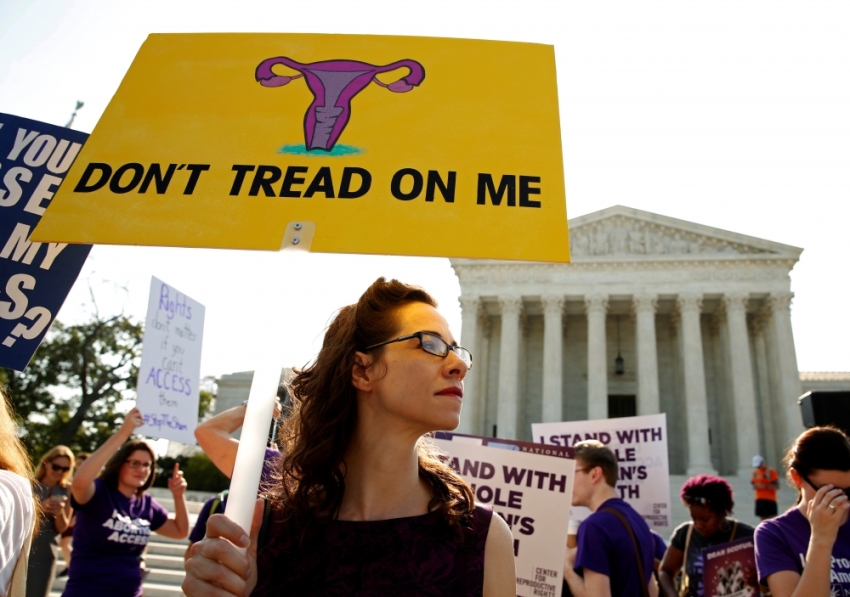Christians Must Get Involved in Politics, Stop Standing on the Sidelines

He also explained a little-known piece of history. After Roe v. Wade, which forced a right to abortion on every state, abortion advocates tried to "require all hospitals and doctors to perform abortions."
Anderson explains, however, that "reasonable pro-choicers" actually disagreed with forcing pro-lifers out of the medical profession because they believe most pro-lifers were reasonable people. The "Church Amendment" named after a Democrat Senator from Idaho passed in June 1973, and the abortion advocates who tried to impose "an abortion-litmus test" lost. Pro-lifers' right to not participate in abortion was acknowledged at the federal level.
He then emphasized that pro-lifers are often viewed as reasonable, while pro-marriage people are viewed in the same light as "racist bigots." He said his largely liberal classmates at Princeton were "less willing to coerce me, less willing to penalize me, less willing to demonize me" as a pro-lifer. But, when he now takes a stand on marriage, they "think I'm an idiot, they think I'm dangerous, they think I'm responsible for the Orlando shooting."
"If all you have ever heard about gays and Christians is 'God hates fags,' what are you likely to believe about Christians and same-sex marriage?" he asked.
Anderson believes we should do a better job of presenting the truth about our beliefs on marriage and asks, "What can we do to reach out to reasonable people on the left" who might agree that "America is a big enough country for both of us."
Private businesses and schools, he said, should be free to bake an LGBT cake or to refuse to bake one; free to facilitate LGBT adoptions or free to refuse them.
Anderson then described three changes that have occurred in American culture that have brought us to this point:
1) Change in religion: From without: "Religious voices are no longer welcome in the public square. Religion has no bearing on public life, and therefore you can't bring your values to the public square. This has also resulted in the free exercise of religion" being made into "the freedom of worship." … Christians are "protected inside their chapel, protected inside their homes, but not protected when they run a hospice."
From within: Anderson briefly discussed the "collapse of Mainline churches" and how many "evangelicals [are] hesitant to step into the public square," in part because "they want to be liked" or are "less willing to engage in these social issues." He also mentioned the "fracturing in the Catholic church" between the "John Paul Catholics and the liberal Catholics."
He also spoke to the belief that God isn't "a God that places demands on us; He's not a God that places standards on us." People who "don't understand the concept of duties … don't take conscience rights seriously."
2) Growth of the state: Anderson explained that our Founders would greatly question the growth and aggressiveness of the federal government and would ask: "What is the FDA and what is the Department of HHS? Why is it that Congress never voted on these issues?"
"At one point we had a presumption of freedom [where] government has to justify what it's doing," he added. And now, we are the ones who have to prove to the government why we deserve to have exceptions.
3) Change in sexuality: Anderson noted that every religious liberty case today is about "sex in one way or another — whether it's abortion or contraception or same sex marriage."
"The ACLU isn't against religious liberty when it means a Muslim inmate gets to grow an inch and a half beard, the ACLU isn't against religious liberty when it means the Amish get to homeschool their children … the ACLU is against religious liberty when it means a conservative Christian might get to not have to dispense the Morning After Pill or not have to perform an abortion or not have to participate in a same-sex marriage. They're now on the wrong side [of religious liberty] because it puts them on the wrong side of their other issues — of the sexual revolution."
Anderson closed with a game plan: "We need to be more political, not less political. If anything we need to become more engaged in the political process and we need to become more engaged in a more strategic way."
"We have the cultural part, we have the pastors involved, we have the think tanks involved, we have the lawyers involved," he said, "but we don't have the political part — the C-4s. "Christians and conservatives need to get involved" in political advocacy. The thought that we need to sit back because of all the setbacks is "backwards."
"Saying leave me alone to be a bigot is not a winning strategy. Because what we believe on these issues isn't bigotry, it's the truth. Unless we're willing to make public arguments in the public square in defense of the truth, we have no reason to think we'll have freedom to live by the truth in years to come."



























